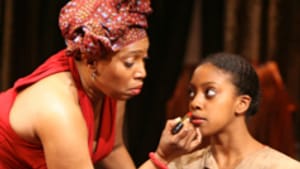Stay in the Loop
BSR publishes on a weekly schedule, with an email newsletter every Wednesday and Thursday morning. There’s no paywall, and subscribing is always free.
What did you do in the war, mama?
Lynn Nottage's "Ruined' on Broadway

Lynn Nottage's Ruined is an intense and searing play about the senseless, endless civil war in the Democratic Republic of Congo, a war that has killed an estimated 4 million people. One of the primary weapons used by the militias is rape: Somewhere between 60,000 and 400,000 women have been kidnapped and, as one character describes her five-month ordeal, tied by the foot to a tree "like a goat," and passed from man to man "like a washrag."
Some women, like the central characters of this play, have been raped by bayonets so violently and so repeatedly that their bodies are "ruined." The word carries with it the implication of spoiled and useless, rendering these victims the objects of shame and rejection by their villages and families alike. This process both literalizes and culturally endorses the idea of blaming the victim.
"T. I. A." or "This is Africa"— the cynical, horrifying slogan of the 2006 film Blood Diamond— sums up in three letters the brutality that has beset that continent. It's the particular tragedy and staggering irony of Congo that a country so impoverished and suffering should possess natural resources capable of triggering some of the world's most appalling greed: ivory, gold, diamonds, uranium and, most recently, 80% of the earth's supply of coltan, a mineral crucial in the making of video games, cell phones and computers. As the character Mama Nadi (Saidah Arrika Ekulona) says, "We're in Congo—things slip through our fingers like butter."
The carnal whims of passing thugs
But you can't write a good play about information: It must have people to make the information matter. And Ruined is filled with robust, individualized characters who— despite their scars, their limps, their deformities— reveal their stamina and their humanity.
Chief among them is Mama Nadi, who runs a bar with a brothel in the middle of the forest, catering to the carnal whims of the passing thugs. Which uniform these "liberators" or "rebels" wear hardly matters: they are to her, and to us, indistinguishable. The door never closes at Mama's place—not to anyone.
We get to know three of her "girls": Josephine (Cherise Boothe), a sexy, hard-bitten, resigned hooker; Sophie (Condola Rashad), a beautiful young woman who is deeply damaged but whose eyes can still open wide with astonishment; and Salima (Quincy Tyler Bernstine), a young wife and mother whose monologue recounting the calamitous but "bright and beautiful" day when she was abducted is the heartbreaking center of Act Two.
Parallels with Brecht
Mama Nadi is a Mother Courage, a war profiteer who takes no sides and feels no loyalties, protecting while exploiting her damaged children. But Nottage's conclusion is happier than Brecht's: Mama is courted by a poem-writing traveling salesman (Russell G. Jones). The lone white man (Tom Mardirosian) is the casual exploiter, a louche presence, nicely underplayed by both actor and playwright.
The grim story is rendered entertaining by the bar's entertainment: Sophie, too ruined to work as a whore, sings, accompanied by a couple of excellent musicians. And there's some great, if desperate, dancing. The original music by Dominic Kanza (with lyrics by Nottage) lingers in the mind.
The set (designed by Derek McLane) evokes the insistently cheerful oasis in the jungle, and the lighting (designed by Peter Kaczorowski) provides the drama of hot sunlight and sudden storms. T.I.A.
Some women, like the central characters of this play, have been raped by bayonets so violently and so repeatedly that their bodies are "ruined." The word carries with it the implication of spoiled and useless, rendering these victims the objects of shame and rejection by their villages and families alike. This process both literalizes and culturally endorses the idea of blaming the victim.
"T. I. A." or "This is Africa"— the cynical, horrifying slogan of the 2006 film Blood Diamond— sums up in three letters the brutality that has beset that continent. It's the particular tragedy and staggering irony of Congo that a country so impoverished and suffering should possess natural resources capable of triggering some of the world's most appalling greed: ivory, gold, diamonds, uranium and, most recently, 80% of the earth's supply of coltan, a mineral crucial in the making of video games, cell phones and computers. As the character Mama Nadi (Saidah Arrika Ekulona) says, "We're in Congo—things slip through our fingers like butter."
The carnal whims of passing thugs
But you can't write a good play about information: It must have people to make the information matter. And Ruined is filled with robust, individualized characters who— despite their scars, their limps, their deformities— reveal their stamina and their humanity.
Chief among them is Mama Nadi, who runs a bar with a brothel in the middle of the forest, catering to the carnal whims of the passing thugs. Which uniform these "liberators" or "rebels" wear hardly matters: they are to her, and to us, indistinguishable. The door never closes at Mama's place—not to anyone.
We get to know three of her "girls": Josephine (Cherise Boothe), a sexy, hard-bitten, resigned hooker; Sophie (Condola Rashad), a beautiful young woman who is deeply damaged but whose eyes can still open wide with astonishment; and Salima (Quincy Tyler Bernstine), a young wife and mother whose monologue recounting the calamitous but "bright and beautiful" day when she was abducted is the heartbreaking center of Act Two.
Parallels with Brecht
Mama Nadi is a Mother Courage, a war profiteer who takes no sides and feels no loyalties, protecting while exploiting her damaged children. But Nottage's conclusion is happier than Brecht's: Mama is courted by a poem-writing traveling salesman (Russell G. Jones). The lone white man (Tom Mardirosian) is the casual exploiter, a louche presence, nicely underplayed by both actor and playwright.
The grim story is rendered entertaining by the bar's entertainment: Sophie, too ruined to work as a whore, sings, accompanied by a couple of excellent musicians. And there's some great, if desperate, dancing. The original music by Dominic Kanza (with lyrics by Nottage) lingers in the mind.
The set (designed by Derek McLane) evokes the insistently cheerful oasis in the jungle, and the lighting (designed by Peter Kaczorowski) provides the drama of hot sunlight and sudden storms. T.I.A.
What, When, Where
Ruined. By Lynn Nottage; directed by Kate Whoriskey. Through June 28, 2009 at Manhattan Theatre Club, 131 W. 55th St., New York. (212) 581-1212) or www.nycitycenter.org.
Sign up for our newsletter
All of the week's new articles, all in one place. Sign up for the free weekly BSR newsletters, and don't miss a conversation.

 Toby Zinman
Toby Zinman